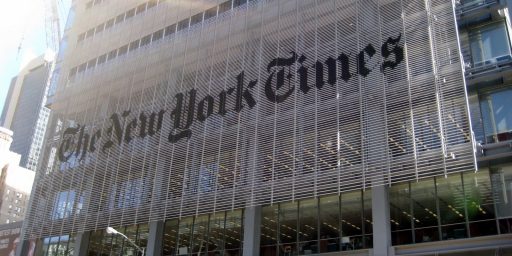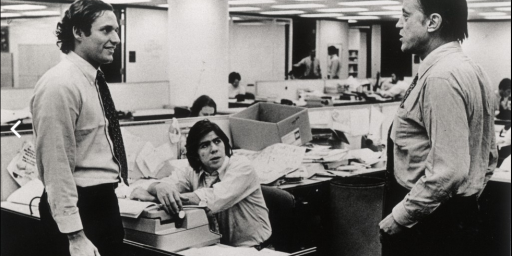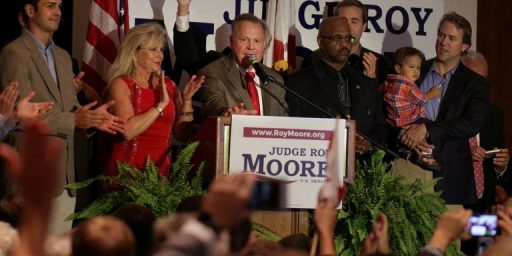Is The New York Times a Liberal Newspaper?
Dan Okrent, the NYT Public Editor, asks and answers a question to which the answer is rather obvious : “Is The New York Times a Liberal Newspaper? [RSS]
Of course it is.
The fattest file on my hard drive is jammed with letters from the disappointed, the dismayed and the irate who find in this newspaper a liberal bias that infects not just political coverage but a range of issues from abortion to zoology to the appointment of an admitted Democrat to be its watchdog. (That would be me.) By contrast, readers who attack The Times from the left – and there are plenty – generally confine their complaints to the paper’s coverage of electoral politics and foreign policy.
I’ll get to the politics-and-policy issues this fall (I want to watch the campaign coverage before I conclude anything), but for now my concern is the flammable stuff that ignites the right. These are the social issues: gay rights, gun control, abortion and environmental regulation, among others. And if you think The Times plays it down the middle on any of them, you’ve been reading the paper with your eyes closed.
But if you’re examining the paper’s coverage of these subjects from a perspective that is neither urban nor Northeastern nor culturally seen-it-all; if you are among the groups The Times treats as strange objects to be examined on a laboratory slide (devout Catholics, gun owners, Orthodox Jews, Texans); if your value system wouldn’t wear well on a composite New York Times journalist, then a walk through this paper can make you feel you’re traveling in a strange and forbidding world.***
Times publisher Arthur O. Sulzberger Jr. doesn’t think this walk through The Times is a tour of liberalism. He prefers to call the paper’s viewpoint “urban.” He says that the tumultuous, polyglot metropolitan environment The Times occupies means “We’re less easily shocked,” and that the paper reflects “a value system that recognizes the power of flexibility.” He’s right; living in New York makes a lot of people think that way, and a lot of people who think that way find their way to New York (me, for one). The Times has chosen to be an unashamed product of the city whose name it bears, a condition magnified by the been-there-done-that irony afflicting too many journalists. Articles containing the word “postmodern” have appeared in The Times an average of four times a week this year – true fact! – and if that doesn’t reflect a Manhattan sensibility, I’m Noam Chomsky.
My excerpt is long enough; the portions I skipped are simply Okrent taking a tour of the paper and giving examples of the liberal bias of the paper.
Frankly, as Okrent himself notes, this is all rather obvious. It’s also perfectly legitimate. All newspapers, anywhere, are biased in their coverage. The idea that papers should be “objective” is a relatively new one, going back a century or so and, ironically, associated with the New York Times. The earliest papers in the Republic, though, were unabashedly partisan. Further, they didn’t even pretend to be fair in their coverage.
Aside from ideology and partisanship, reportage is filtered through the lens of publishers and editors with worldviews who, even if not particularly political, have to make judgments about what is important (what to cover and not cover) as well as how important the things important enough to cover are (how much space they get, where they are positioned in the paper, how often they’re covered, etc.). My only problem is when the paper pretends otherwise.
Among the early risers reacting to this story:
- Betsy Newmark: “I wonder if the Times editors are paying attention.”
- Joe Gandleman: “DUH!”
- Jeff Jarvis: “To the point.”
- Allah: “Hey, what’s that elephant doing in here?”
- Wind Rider: “…a version of the ‘nature versus nurture’ argument…”
- Michele Catalano: “Liberalism. It’s new elitism.”
- Kevin Aylward: “[P]erhaps coming out of the closet will force Times reporters and editors to rethink injecting their own politics into their reporting.”
- Paul at Wizbang: “Strange that the very liberals whose twin holy grails are tolerance and acceptance have none for any viewpoint but their own.”
- Kathy Kinsley: “True enough.”
I suspect others will weigh in as the day goes on. See Memeorandum for more.






Admitting they have a problem is the first step to recovery.